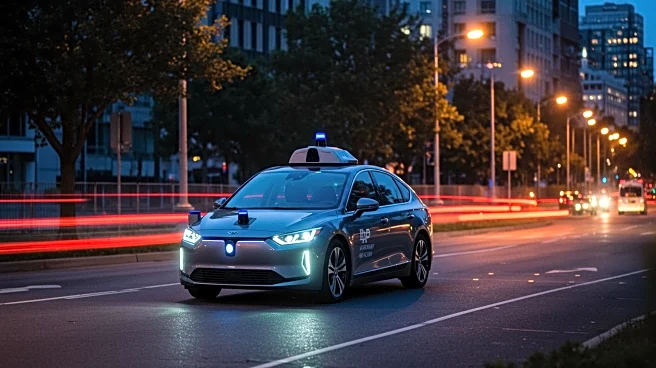What's Happening?
Waymo has been granted a permit to test its autonomous vehicles in New York City, marking the first time such a permit has been issued in the city. The testing will involve up to eight robotaxis operating in Manhattan and Downtown Brooklyn, with safety drivers present in each vehicle. This initiative is part of a broader effort by Waymo to expand its autonomous vehicle operations across the U.S. The New York City Department of Transportation (DOT) has set comprehensive safety guidelines to ensure the safe testing of these vehicles, requiring regular meetings and data reporting from Waymo. The company has also obtained necessary permits from the New York State Department of Motor Vehicles. However, current regulations by the New York City Taxi and Limousine Commission prohibit the use of autonomous vehicles for for-hire services, presenting a challenge for Waymo's commercial aspirations.
Why It's Important?
The introduction of autonomous vehicles in New York City represents a significant step in the evolution of urban transportation. This development could potentially transform the way people commute, offering a glimpse into a future where self-driving cars are commonplace. For Waymo, this testing phase is crucial for gathering data and refining its technology in one of the most complex urban environments in the world. The move also highlights the city's willingness to embrace technological innovation while maintaining a focus on safety. However, the initiative faces opposition from unions and other stakeholders concerned about job losses and safety risks, underscoring the challenges of integrating autonomous vehicles into existing transportation systems.
What's Next?
Waymo's testing period in New York City is set to last until late September 2025, after which the company can apply for an extension. The outcome of this testing phase will likely influence future regulatory decisions and the potential expansion of autonomous vehicle services in the city. Stakeholders, including city officials, transportation unions, and advocacy groups, will be closely monitoring the impact of these tests on traffic, safety, and employment. The results could pave the way for broader adoption of autonomous vehicles in other major cities, provided the technology proves to be safe and efficient.









